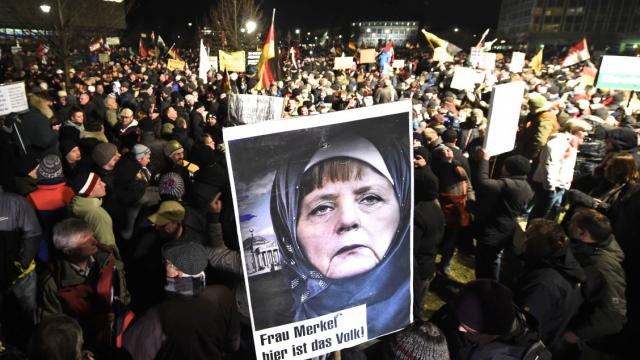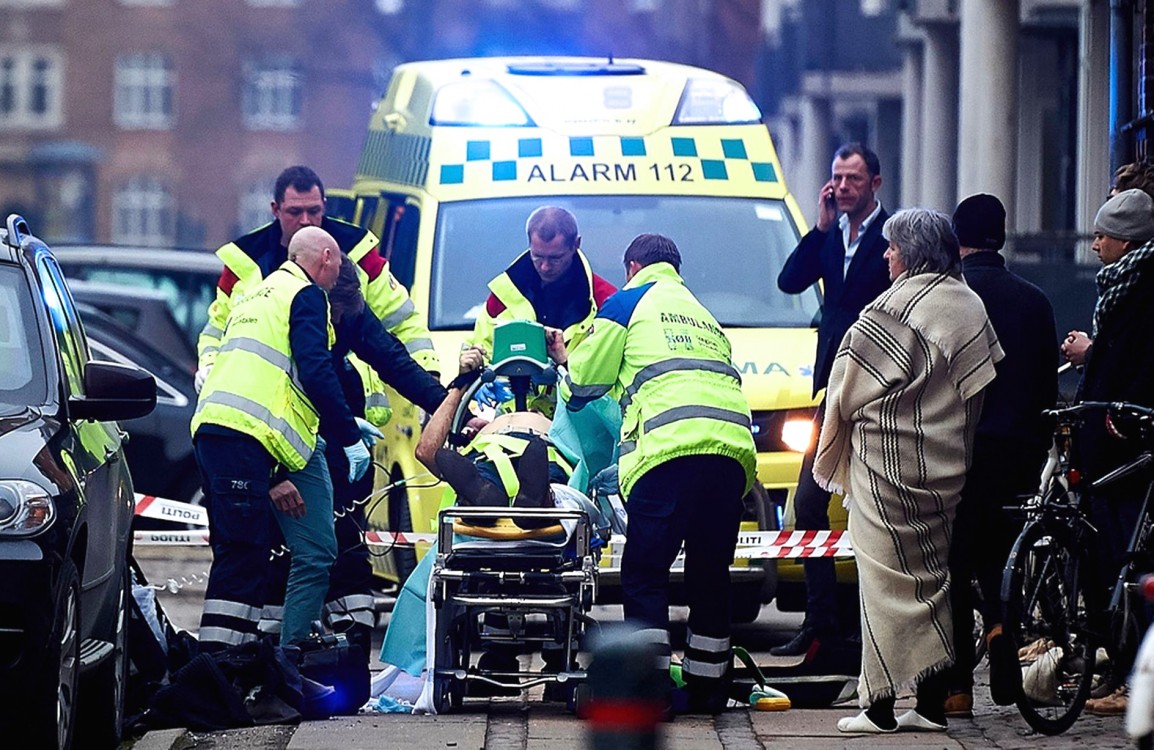
BERLIN, Germany — The presence of the xenophobic Patriotic Europeans Against the Islamization of the West, or Pegida, appears to be fading in Germany thanks to the group's own slip-ups, as well as counter-demonstrators who have consistently fought to diminish its racist message.
Pegida hasn’t marched in recent Mondays, citing unsubstantiated threats of violence against its members. But the circumstances fueling the grassroots group, which at one time mobilized more than 20,000 demonstrators in Dresden and 35,000 across Germany and throughout Europe, are shared: resentment among Europeans who lack economic opportunity amid increasing cultural diversity.
Many Germans share Pegida’s concerns about the growing numbers of Muslims from Syria and elsewhere taking refuge in Europe. The Charlie Hebdo attacks in Paris validated those fears even more – as did the shooting death on Saturday of a film director and a Jewish man by a young Muslim extremist in Copenhagen.
The mainstream appeal of the right-wing Pegida depended on one crucial factor: being able to say, “We’re not Nazis.” But that negative self-definition became increasingly difficult to assert after a photo appeared in late January of Pegida founder Lutz Bachmann dressed as Hitler, while the German newspaper Bild published Lutz's Facebook posts calling refugees “animals.”
Bachmann and six other key Pegida leaders, including the group's spokeswoman, Kathrin Oertel, resigned soon after the Hitleresque photos surfaced.
Prominent neo-Nazi and racist rhetoric have been common at Pegida's Monday rallies. Hooligans Against Salafists, whose anti-Islam demonstrations caused chaos in Cologne, also joined Pegida protests in multiple cities. Outside Germany, the group gained allies among members of the Islamophobic English Defence League and other European far-right groups.
Seeing Bachmann sporting parted black hair and the infamous Hitler moustache, however, confirmed the uncanny resemblance of the Dresden-based group’s xenophobic views to those of Nazi Germany – a connection that columnists, cartoonists and counter-protestors have been making since the group’s inception four months ago.
Yet despite watchdog groups' warnings about their clear Nazi overtones, and regular denunciations by Chancellor Angela Merkel and other government officials, Pegida grew quickly and even attracted a political ally in Alternative for Germany (AfD), a Eurosceptic party.
However, as Pegida's rallies reached a fever pitch following the Charlie Hebdo attack in January — the group used the Paris shootings by radical Islamists to reinforce its own anti-Muslim and anti-immigrant stance — the number of counter-demonstrators grew as well, far outnumbering Pegida supporters.
In Berlin, counter-demonstrators were 10 times as numerous as Pegida marchers, as activists drowned out the group's message with boos and chants like, “Say it loud, say it clear, refugees are welcome here.”
The counter-demonstrators reflected a kaleidoscopic image of Germany: former Olympians, cult singers, archbishops, automotive executives, authors, soccer stars, actors, rabbis and drag queens.
Yet despite the backlash, Pegida appears to remain attractive to many dissatisfied Germans and Europeans. The group is best known for its objections to Islamic influence in German society, but has also incorporated a grab bag of other grievances into its charter – including a call for more police funding, and zero-tolerance policies regarding criminal refugees.
Experts say Pegida's broad net has caught more aging, conservative East Germans who missed out on much of the economic boom enjoyed by their neighbors in the West since the Berlin Wall fell 25 years ago. However, even for those people, dressing up like Hitler apparently went too far. Hooligans against Salafism, for example, broke ties with Pegida after Bachmann’s embarrassing photos hit the press, saying the alliance distracted the group from its battle against radical Islamism.
Before Bachmann quit, Pegida in Dresden was threatening to bring legal action against Pegida in Leipzig, known as Legida, for adopting positions that clashed with the Dresden founding group’s vision. Now, Pegida is encouraging its sympathizers to attend those Leigzig rallies. It’s still not clear whether Legida and other chapters like Pegida in Dusseldorf, or Dudiga, will be joining into a consistent, broader alliance.
In Leipzig, city officials said the Legida offshoot has been banned from holding Monday demonstrations because of excessive threats of violence; police announced last Monday that 1,000 officers weren’t enough to protect the city from the frenzied xenophobic mobs who have made headlines by attacking law enforcement and journalists.
Kathrin Oertel, Pegida's former spokeswomen, has since launched a new organization called the Movement for Direct Democracy in Europe (DDfE), which she hopes will resume the Monday marches in Dresden. Distancing herself from Pegida’s racist overtones, she claims the DDfE movement will focus on political change.
During the Feb. 3 press conference in which Oertel announced the new group, she made apologies for Bachmann’s Hitler role-playing, saying he’s not the only political leader to cause a storm of protest by dressing up like the former Führer.
“The Hitler selfie, which at present is going round the world, well, it’s just a satirical picture which other politicians and prominent people have also done,” Oertel said.
So far, DDfE isn’t gaining traction. Despite a significant media build-up to the group’s first protest on Feb. 9, the march drew only a tenth of the 5,000 protestors expected, revealing what many expect to be a weaker, watered down right-wing movement that lacks the rallying power of its predecessor.
Meanwhile, Pegida is far from its former self, despite Bachman returning to the helm. Last Monday, less than 2,000 showed up for the group's demonstration.
3 WAYS TO SHOW YOUR SUPPORT
- Log in to post comments
















